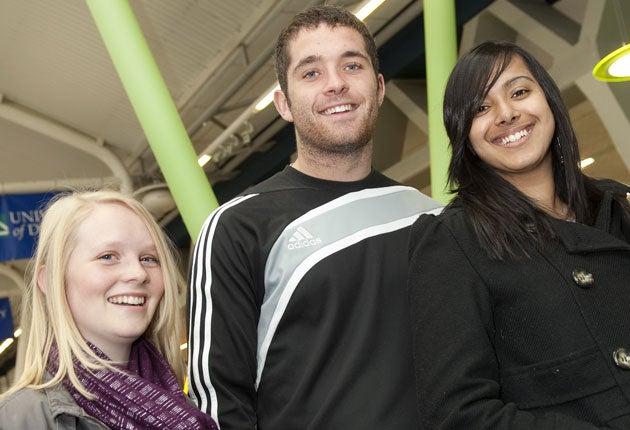Universities finally open their doors to the poor
Research reveals big rise in number of students from disadvantaged backgrounds

Your support helps us to tell the story
From reproductive rights to climate change to Big Tech, The Independent is on the ground when the story is developing. Whether it's investigating the financials of Elon Musk's pro-Trump PAC or producing our latest documentary, 'The A Word', which shines a light on the American women fighting for reproductive rights, we know how important it is to parse out the facts from the messaging.
At such a critical moment in US history, we need reporters on the ground. Your donation allows us to keep sending journalists to speak to both sides of the story.
The Independent is trusted by Americans across the entire political spectrum. And unlike many other quality news outlets, we choose not to lock Americans out of our reporting and analysis with paywalls. We believe quality journalism should be available to everyone, paid for by those who can afford it.
Your support makes all the difference.A significant breakthrough has been made in reducing the class divide in university admissions, figures to be unveiled this month will show.
A study of university admission patterns obtained by The Independent will reveal that the chances of a young person with a disadvantaged background gaining a university place has increased by more than a third in a decade.
In 1996, about 13.5 per cent of young adults from the poorest British households made it to university by age 19. That figure has reached 18.5 per cent.
The findings, which will be published by the Higher Education Funding Council for England (HEFCE), contradict the accepted wisdom that social mobility in Britain has at best stalled – and at worst decreased.
One of the reasons given for the rise is the introduction of means-tested educational maintenance allowances of £30 a week to help pupils from the poorest families stay on at school or college to study for A-levels.
Government ministers will seize on the figures as evidence that the millions of pounds ploughed into widening participation is reaping dividends.
On the basis of past figures – cited in a report by the former cabinet minister Alan Milburn, Fair Access To The Professions, and also by the education charity the Sutton Trust – both the Conservatives and the Liberal Democrats have launched attacks on Labour for widening the social gap.
Last week, a report from the Headmasters' and Headmistresses' Conference (HMC) indicated that the UK's leading universities had become increasingly dependent on pupils from private schools to fill places in subject areas seen as critical to the future of the economy, such as maths, science and modern languages. However, these findings were based on figures from two years ago.
"We're increasingly convinced that there's been a substantial increase in the chances of young people from the poorest areas entering higher education, particularly since the middle of this decade," said Mark Corver, a senior analyst with HEFCE. The findings will also re-ignite claims by independent schools that some universities discriminate against their pupils.
Andrew Grant, the chairman of the HMC and the headteacher of St Alban's School in Hertfordshire, said that pupils from underperforming schools were being given a "leg up". He cited a "modifier" employed by Durham University which gives more weight to GCSE scores from pupils attending schools with below average exam results. HEFCE officials believe that the findings, which will be published later in the autumn, show that the introduction of top-up fees are not deterring less well-off pupils from applying for university places.
However, the Sutton Trust, which aims to get more pupils from working class homes into Britain's leading universities, said more work needed to be done before the battle could be won.
James Turner, the charity's policy director, described the findings as "heartening" but he said: "Fewer than one in 25 from the poorest areas reach top universities, and there hasn't been much improvement since 2002/03."
It is also feared that a further hike in the level of top-up fees will stem from a government inquiry to be announced later this month.
Join our commenting forum
Join thought-provoking conversations, follow other Independent readers and see their replies
Comments